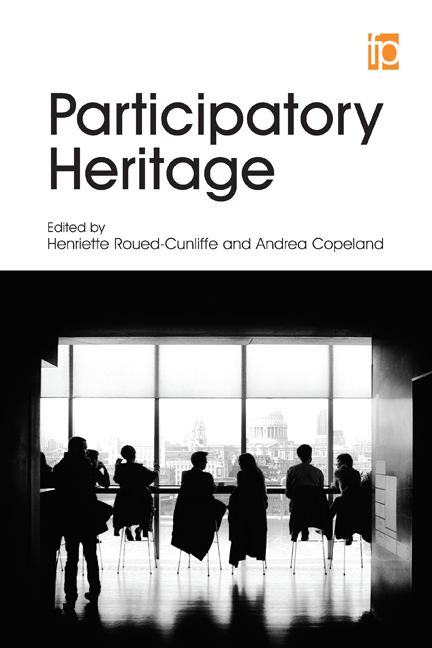Book contents
- Frontmatter
- Contents
- List of figures and tables
- Contributors
- Introduction: what is participatory heritage?
- Part 1 Participants
- Part 2 Challenges
- 8 Custodianship and online sharing in Australian community archives
- 9 Who is the expert in participatory culture?
- 10 Social inequalities in the shaping of cultural heritage infrastructure
- 11 No Gun Ri Digital Archive: challenges in archiving memory for a historically marginalized incident
- 12 Giving voice to the community: digitizing Jeffco oral histories
- 13 Issues with archiving community data
- Part 3 Solutions
- Further reading
- Index
11 - No Gun Ri Digital Archive: challenges in archiving memory for a historically marginalized incident
from Part 2 - Challenges
Published online by Cambridge University Press: 08 June 2018
- Frontmatter
- Contents
- List of figures and tables
- Contributors
- Introduction: what is participatory heritage?
- Part 1 Participants
- Part 2 Challenges
- 8 Custodianship and online sharing in Australian community archives
- 9 Who is the expert in participatory culture?
- 10 Social inequalities in the shaping of cultural heritage infrastructure
- 11 No Gun Ri Digital Archive: challenges in archiving memory for a historically marginalized incident
- 12 Giving voice to the community: digitizing Jeffco oral histories
- 13 Issues with archiving community data
- Part 3 Solutions
- Further reading
- Index
Summary
DIGITAL ARCHIVE PROJECTS often face challenges, from financial constraints to technological problems, from legal and ethical issues to specific challenges from organizational context (McKay, 2003). When it is a multi-institutional project, challenges can include different cultures, levels of engagement, methods of communication and many others. There are additional issues if the main entity conducting the project is not the one holding the materials. The No Gun Ri Digital Archive project aims to create a digital platform for the memory of the No Gun Ri massacre. The project team comes from three different universities in two countries (University at Albany in the US and Chung-Ang University and Chun-Buk University in South Korea). No one is directly associated with the No Gun Ri Museum or any survivors. This project received limited funding from the Korean National Research Foundation. In this situation, the No Gun Ri Digital Archive Project has an interesting research process and challenges. This chapter will discuss some of these challenges and some insights learned from them.
No Gun Ri Massacre
The No Gun Ri massacre was a mass killing of refugees during the Korean War. The massacre occurred during four days, from 26 to 29 July 1950, in the middle of a refugee evacuation operation by American soldiers, and hundreds of people were killed.
Refugees became the main victims of the Korean War because of suspicions of guerilla infiltration. The US military adopted a policy of allowing lethal weapons to be used against South Korean refugees who approached US lines. This policy was decided in a meeting among the highest officials of the US Army on the day before the No Gun Ri killing (Conway-Lanz, 2005). There are many military documents from army units near No Gun Ri that describe orders to fire on approaching civilians. There are some other factors identified by researchers working on No Gun Ri, such as the lack of sufficient training for soldiers (Kuehl, 2003; Ryoo, 2001) and unfamiliarity with the Korean people and their culture (Cumings, 1990, 690–1). The connection between the war situation and refugee casualties is described thus in Encyclopedia Britannica: ‘weakened by inadequate weapons, limited numbers, and uncertain leadership, US troops were frequently beset by streams of refugees fleeing south … These produced unfortunate attacks on Korean civilians’.
- Type
- Chapter
- Information
- Participatory Heritage , pp. 105 - 116Publisher: FacetPrint publication year: 2017



